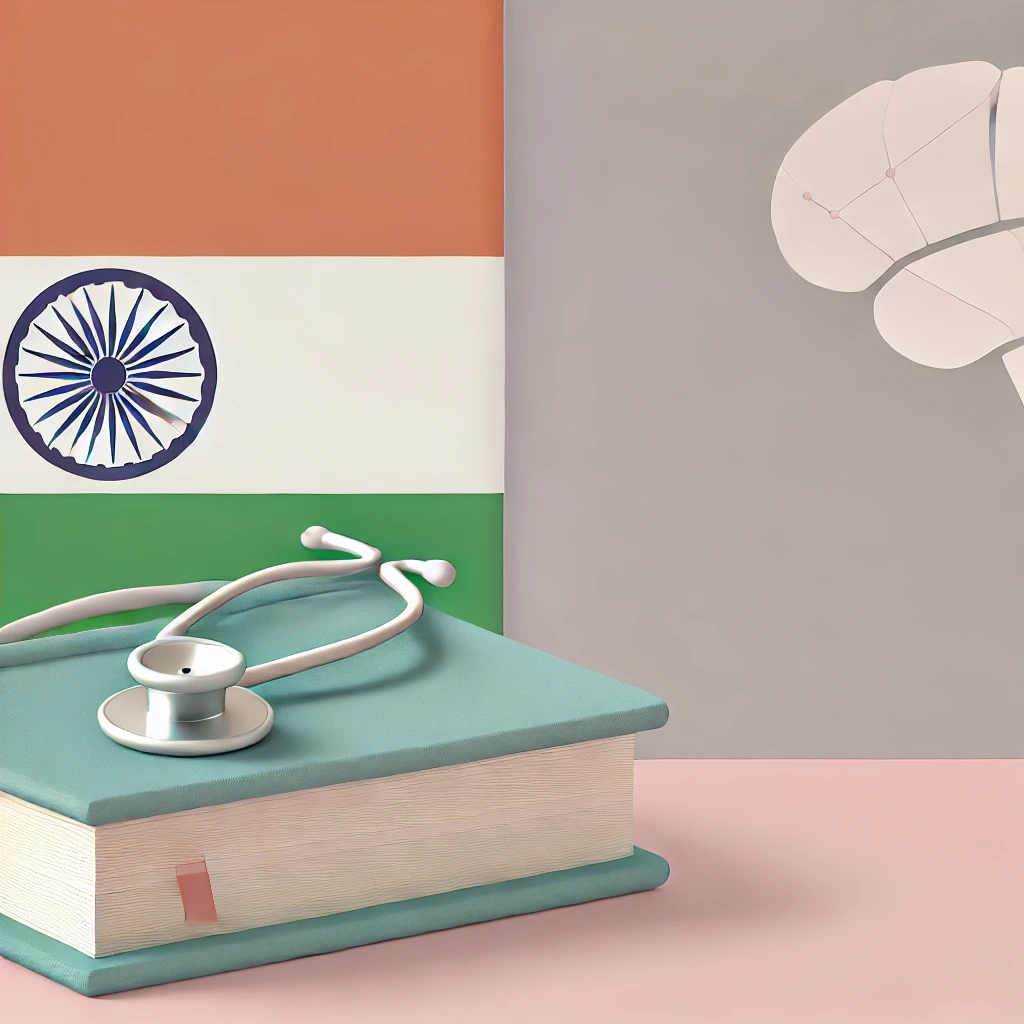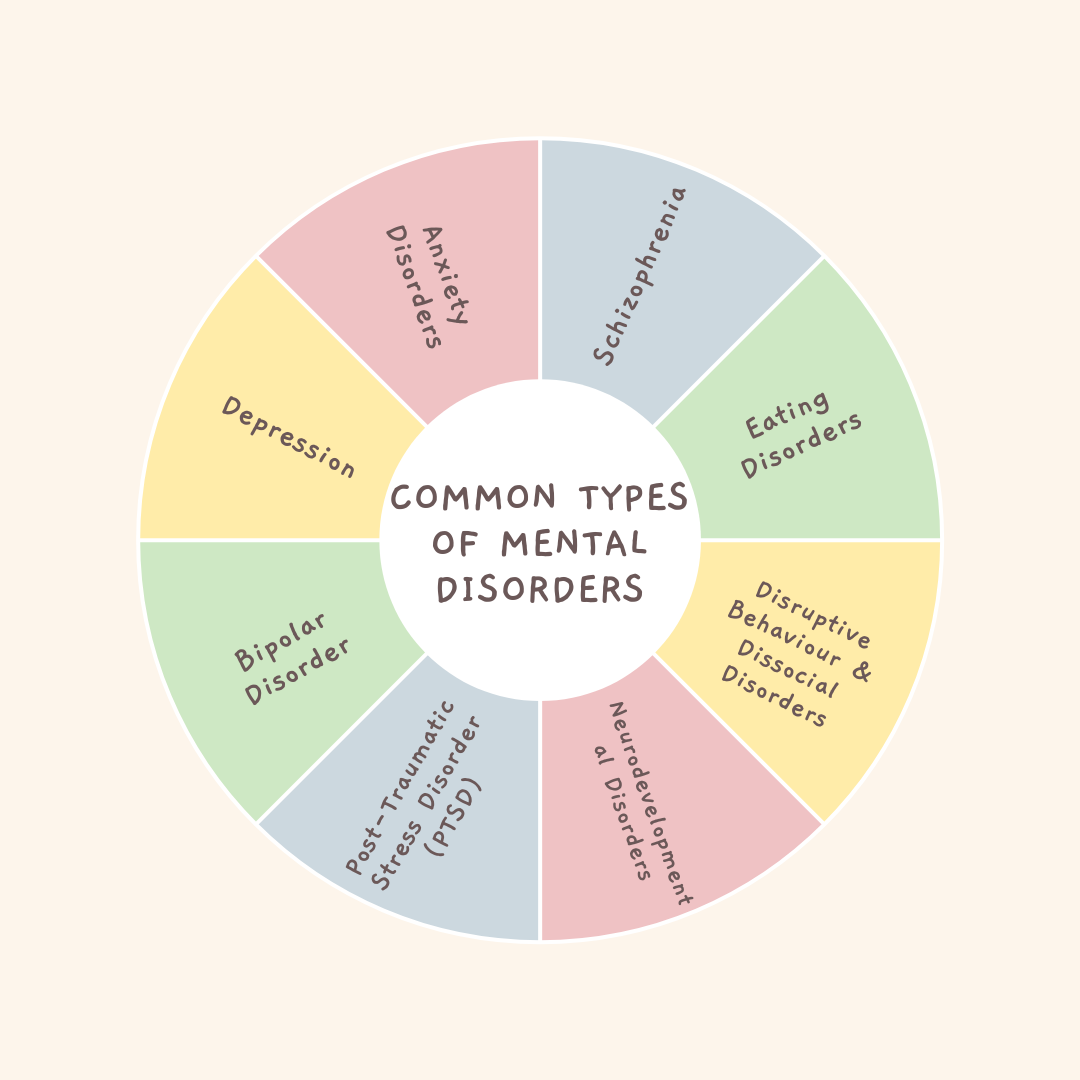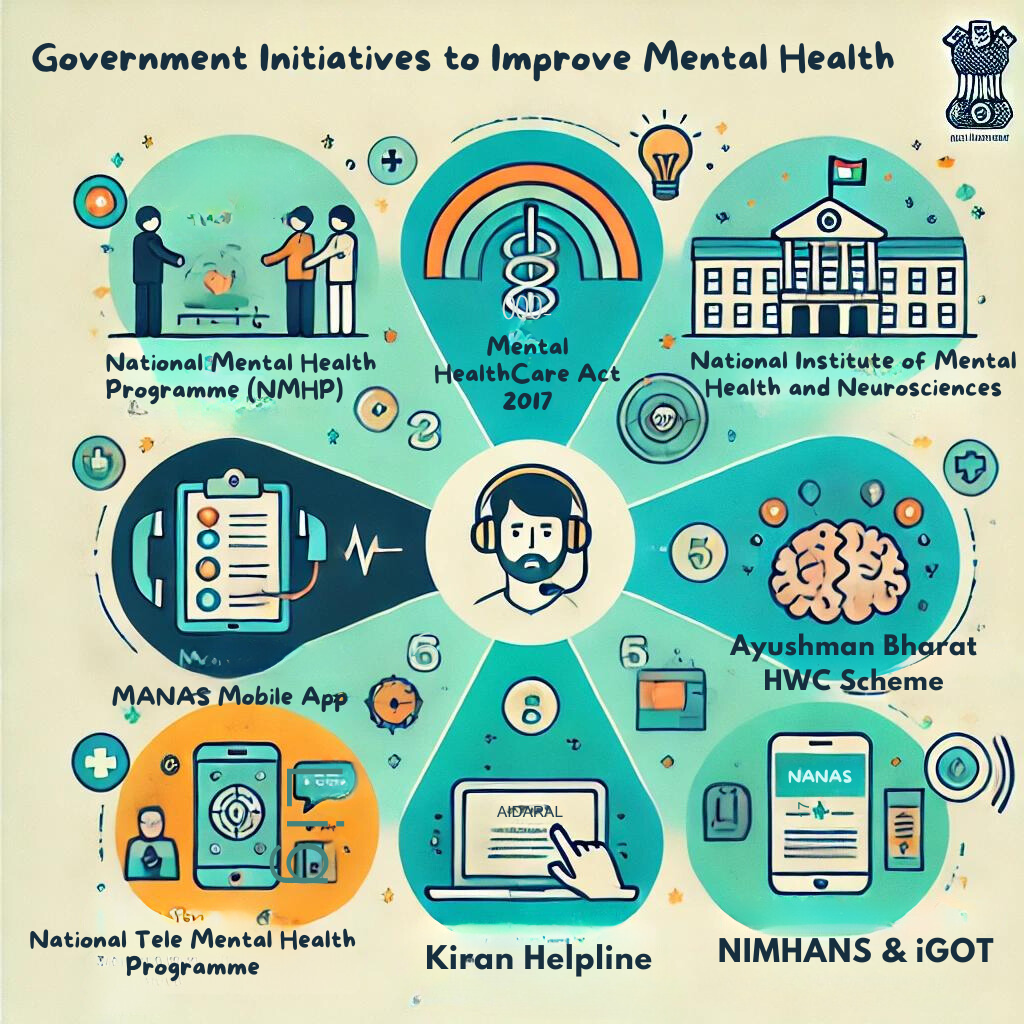Mental health is a crucial aspect of overall well-being, yet it has been largely ignored in India. Recently, the National Medical Commission set up a Task Force to address the mental health of medical students, highlighting the urgent need for a comprehensive mental health policy. India’s mental healthcare system faces numerous challenges, from policy neglect to inadequate infrastructure.
| GS Paper | General Studies II |
| Topics for UPSC Prelims | Mental Health, National Medical Commission, WHO, National Mental Health Survey, National Crime Records Bureau (NCRB), National Mental Health Policy, National Mental Health Programme, National Institute of Mental Health and Neurosciences (NIMHANS), Kiran Helpline, Mental HealthCare Act 2017. |
| Topics for UPSC Mains | Prevalence of Mental Health Disorders in India, Key Challenges Faced by the Mental Healthcare System in India, Way Forward to Improve Mental Healthcare in India. |
Origin of the Article
This editorial is based on “Mental health of medical students can no longer be ignored,” published in The Indian Express on 19/08/2024. The article outlines India’s mental healthcare problems and proposes solutions.
Relevancy for UPSC Students
Understanding mental healthcare is crucial for UPSC aspirants regarding GS Paper 2, focusing on government policies and interventions. Knowledge of mental health issues and policies can aid in writing essays, answering mains questions, and understanding public health dynamics.

Why in News
The recent establishment of a Task Force by the National Medical Commission to address mental health issues among medical students highlights the urgent need for a robust mental healthcare system in India. Given the alarming statistics of student suicides and mental health challenges, this topic is crucial for UPSC aspirants, linking directly to GS Paper 2 under Government Policies & Interventions and Health. The issue is pertinent as mental health policies and their effective implementation have been recurrent themes in UPSC Mains questions, reflecting the examination’s focus on public health and governance.
What is Mental Health?
the normalAccording to the World Health Organization (WHO), mental health is a state of well-being in which an individual realizes their abilities, can cope with normal stresses of life, work productively, and contribute to their community. Mental well-being is crucial for daily functioning and societal contributions.
Good Mental Health
Good mental health is marked by emotional stability, resilience, and self-esteem. It involves the ability to cope with stress effectively, maintain positive relationships, and have a balanced perspective on life. Emotional stability and resilience are key indicators of sound mental health.
Mental Health Conditions
Mental health conditions encompass mental disorders and psychosocial disabilities, involving significant distress, impairment in functioning, or risk of self-harm. These conditions can severely affect cognition, emotional regulation, and behavior, necessitating timely intervention and treatment.
Common Types of Mental Disorders
- Anxiety Disorders: Characterized by excessive fear and worry, anxiety disorders lead to significant behavioral disturbances. In 2019, 301 million people, including 58 million children and adolescents, were affected by anxiety disorders globally.
- Depression: Depression involves persistent feelings of sadness, hopelessness, and a lack of interest in activities. In 2019, around 280 million individuals, including 23 million children and adolescents, were living with depression worldwide.
- Bipolar Disorder: Bipolar disorder features alternating periods of depression and mania. Depressive episodes involve persistent sadness, while manic episodes are marked by elevated mood and impulsive behavior. Individuals with bipolar disorder are at a higher risk of suicide.
- Post-Traumatic Stress Disorder (PTSD): PTSD develops after exposure to traumatic events, leading to persistent reliving of the trauma through flashbacks or nightmares. It also involves heightened arousal and significant distress.
- Schizophrenia: Schizophrenia is a severe mental disorder characterized by distorted thinking, perceptions, and emotions, leading to a disconnect from reality. It affects approximately 24 million people worldwide.
- Eating Disorders: Eating disorders, such as anorexia nervosa and bulimia nervosa, involve abnormal eating behaviors and a preoccupation with body weight, resulting in significant distress and impairment in functioning.
- Disruptive Behaviour and Dissocial Disorders: These disorders are marked by persistent behavior problems that violate societal norms and the rights of others, including defiant and disobedient behaviors.
- Neurodevelopmental Disorders: Neurodevelopmental disorders arise during the developmental period and affect intellectual, motor, language, or social functions. They include autism spectrum disorder, ADHD, and intellectual development disorders.

How Prevalent are Mental Health Disorders in India?
National Mental Health Survey (2015-16)
A study by the National Institute of Mental Health & Neurosciences (NIMHANS) revealed that 13.7% of India’s population suffers from various mental illnesses, with 10.6% requiring immediate intervention. This highlights the widespread nature of mental health issues in the country.
Suicide Rates
India has the highest number of suicides globally. According to the National Crime Records Bureau (NCRB), 1.71 lakh people died by suicide in 2022, with a suicide rate of 12.4 per 1,00,000. This alarming statistic underscores the urgent need for mental health interventions.
Depressive Disorders
The World Health Organization reports that India has 56 million people suffering from depression and 38 million from anxiety disorders. This indicates a severe mental health crisis, necessitating comprehensive mental health strategies and services.
What are the Key Challenges Faced by the Mental Healthcare System in India?
Low Policy Priority
Mental health has historically received low priority in Indian policymaking. Despite needing over Rs 93,000 crore for mental health, the government allocated only Rs 1,000 crore in the latest budget, primarily to tertiary institutions, indicating a significant policy gap.
Inadequate Mental Health Infrastructure
India’s mental health infrastructure is severely lacking, with only 0.75 psychiatrists per 100,000 population, far below the desirable number of over 3 per 100,000. This shortage hampers our ability to meet the growing demand for mental health services.
High Treatment Costs
The prohibitive cost of mental health services in private healthcare settings leads to a treatment gap of 83%. Many Indian households fall into poverty due to the high costs associated with mental illness treatment, highlighting the need for affordable mental health care.
Challenges in Policy Implementation
Despite the National Mental Health Policy of 2014 and the Mental Health Act of 2017, there is a significant gap in implementation, resource allocation, and timelines. This disconnect between policy and practice undermines efforts to improve mental health care.
Urban-Rural Divide
Mental health services are predominantly urban-centric, leaving rural populations with limited access to care. This geographical disparity exacerbates mental health issues in rural areas, necessitating a more equitable distribution of services.
Stigma and Discrimination
Mental health issues are heavily stigmatized in India, leading to social discrimination and discouraging individuals from seeking help. This stigma worsens mental health conditions and hinders efforts to provide effective care.
Lack of Awareness and Education
There is a significant lack of mental health awareness and education, leading to misconceptions and neglect. Insufficient educational initiatives fail to promote mental health literacy, further aggravating the mental health crisis.
What Steps Has the Government Taken to Improve Mental Health?

National Mental Health Programme (NMHP)
The NMHP aims to integrate mental health services into general healthcare and provide quality care across all levels. This program seeks to make mental health services more accessible and effective.
Mental HealthCare Act 2017
This Act safeguards the rights of patients and ensures access to mental health services. It mandates the provision of mental health care, protection from inhumane treatment, and the right to make advance directives.
National Institute of Mental Health and Neurosciences (NIMHANS)
NIMHANS plays a critical role in research, training, and providing mental health services. It is a premier institution dedicated to advancing mental health care in India.
National Tele Mental Health Programme
This program leverages telemedicine to provide mental health services, improving access, especially in remote areas. It aims to bridge the gap in mental health care delivery.
NIMHANS and iGOT-Diksha Collaboration
This collaboration focuses on training and capacity building for mental health professionals. It aims to enhance the skills and knowledge required to address mental health issues effectively.
Ayushman Bharat – HWC Scheme
This scheme includes health and wellness centers that provide comprehensive primary health care, including mental health services. It aims to make mental health care more accessible at the grassroots level.
Kiran Helpline
The Kiran Helpline offers 24/7 support for mental health crises, providing immediate assistance and counseling. It is a crucial resource for individuals in distress.
MANAS Mobile App
The MANAS app provides mental health resources and self-help tools, making mental health support accessible through digital means. It is designed to promote mental well-being and provide timely assistance.
What Should Be the Way Forward to Improve Mental Healthcare in India?
Increase Funding for Mental Health
Allocate a higher percentage of the health budget to mental health services. This investment is crucial for developing mental health infrastructure and addressing the needs of vulnerable groups.
Expand Facilities
Develop more mental health facilities, including community health centers and emergency care units, to cover underserved areas. Enhance access to mental health services in rural and remote areas through mobile health units and telemedicine.
Support Economic Stability
Promote employment guarantee programs like MNREGS to provide job security and financial stability. Ensure that social security measures are accessible to all, including informal workers, to alleviate economic stress.
Ensure Effective Implementation of National Policies and Acts
Implement national policies and acts effectively, integrating mental health into general healthcare. Establish robust systems for data collection and resource allocation to inform policy decisions.
Training and Capacity Building
Provide specialized training for primary care doctors and mental health professionals. Increase the number of mental health professionals through educational programs and incentives to improve early detection and intervention.
Learning Lessons from Combating HIV-AIDS
Adopt strategies from the successful HIV-AIDS campaign, including evidence-based interventions and stakeholder participation. Community involvement is crucial for addressing mental health issues effectively.
Collaboration and Partnerships
Collaborate with NGOs, healthcare providers, and community organizations to expand mental health services. Organizations like Banyan, Sangath, and CMHLP have made significant contributions through innovative strategies.
Promote Awareness and Recognition
Implement mental health awareness campaigns and training programs to reduce stigma and encourage early intervention. Improving mental health literacy is essential for addressing mental health issues effectively.
PESTEL Analysis
| Political: The Indian government’s low prioritization of mental health is evident in insufficient funding and ineffective policy implementation. Initiatives like the Mental HealthCare Act 2017 and the National Mental Health Programme show promise but require stronger political will for better execution. Economic: High treatment costs in private healthcare and the lack of widespread, affordable mental health services contribute to economic disparities. Expanding facilities and ensuring job security could improve economic stability and access to mental health services. Social: Stigma and discrimination around mental health discourage individuals from seeking help. Efforts to increase awareness and reduce stigma are essential to improving mental health literacy and encouraging early intervention. Technological: Programs like the National Tele Mental Health Programme and mobile apps such as MANAS are steps toward integrating technology in mental healthcare, making services more accessible, especially in underserved areas. Environmental: Urban-rural disparities in mental health services highlight the need for infrastructure development in rural areas to ensure equal access across the country. Legal: The Mental HealthCare Act 2017 provides a legal framework for protecting the rights of those with mental illnesses, but challenges remain in its implementation, necessitating better enforcement and resource allocation. |
Conclusion
To enhance mental healthcare in India, it is crucial to prioritize mental health through increased funding, the integration of services into primary care, and the use of technology to expand access. While the recent task force focusing on medical student mental health is a positive development, more comprehensive measures are needed. Addressing mental health is essential for upholding the fundamental human right to health and advancing SDG 3 on ‘good health and well-being’.
| UPSC Civil Services Examination, Previous Year Questions (PYQs) Mains Q. Public health system has limitations in providing universal health coverage. Do you think that the private sector could help in bridging the gap? What other viable alternatives would you suggest? (GS Paper II, 2022) Q. Critically examine the impact of the COVID-19 pandemic on mental health in India. What steps should the government and civil society take to address the mental health crisis that has emerged during this period? |

